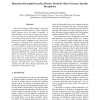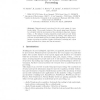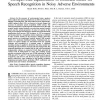106 search results - page 13 / 22 » Survey and evaluation of acoustic features for speaker recog... |
CSL
2007
Springer
2007
Springer
Speaker-adaptive learning of resonance targets in a hidden trajectory model of speech coarticulation
13 years 7 months ago
A novel speaker-adaptive learning algorithm is developed and evaluated for a hidden trajectory model of speech coarticulation and reduction. Central to this model is the process o...
ICPR
2010
IEEE
14 years 2 months ago
2010
IEEE
The Gaussian Mixture Model (GMM) is often used in conjunction with Mel-frequency cepstral coefficient (MFCC) feature vectors for speaker recognition. A great challenge is to use ...
INTERSPEECH
2010
13 years 2 months ago
2010
In this work, the RWTH automatic speech recognition systems for English and German for the second Quaero evaluation campaign 2009 are presented. The systems are designed to transc...
NOLISP
2007
Springer
14 years 1 months ago
2007
Springer
Abstract. Natural speech is produced by the vocal organs of a particular talker. The acoustic features of the speech signal must therefore be correlated with the movements of the a...
TASLP
2010
13 years 2 months ago
2010
In the presence of environmental noise, speakers tend to adjust their speech production in an effort to preserve intelligible communication. The noise-induced speech adjustments, c...



